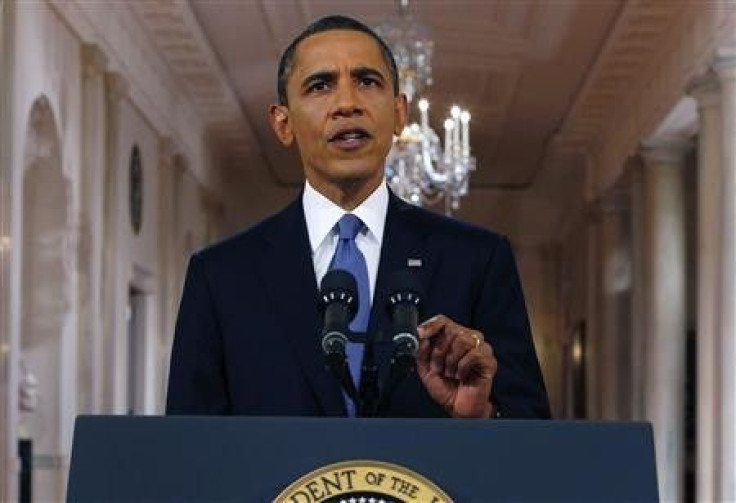Obama’s Afghanistan Drawdown Plan Gets Mixed Reviews

President Obama's plan to accelerate the withdrawal of troops from Afghanistan has already provoked an outpouring of reactions at home and abroad, ranging from praise for his boldness to criticisms that he is not being bold enough or is acting rashly.
In a speech last night, Obama argued that America had successfully disabled the threat of terrorism emanating from Afghanistan and would shift its priorities to focus on nation-building here at home. His timeline for withdrawing 10,000 troops by the end of this year and another 20,000 by next summer represents a larger and swifter reduction than his military commanders had recommended, although the troops remaining will still be more than double the amount there when he took office.
The increasingly unpopular Afghanistan War has been the subject of intense and sometimes polarizing debate in Congress recently, evidenced by the range of reactions. U.S. Sen. John Kerry, D-Mass., and chair of the Foreign Relations Committee, lauded a plan that he said would allow Afghans to make their own choices about their own future and would change the political calculation of everybody on the ground. U.S. Sen. John McCain, R-Arizona, has been vocal in his warnings about withdrawing troops too rapidly and charged that this is not the 'modest' withdrawal that I and others had hoped for and advocated.
While Republicans have been among those questioning America's continued involvement in Afghanistan, some Congressional Republicans accused Obama of disregarding his military advisers or of trying to score political points. U.S. Rep. Mike Rogers, R-Minn., and chairman of the House Intelligence Committee, said, it seems the president is trying to find a political solution with a military component to it, when it needs to be the other way around.
U.S. Rep. Randy Hultgren, R-Illinois, said that the precipitous withdrawal - faster than was advised by our military commanders - threatens to undermine the progress we have made there, adding that troop reductions should occur at a more modest pace. Speaker of the House Speaker John Boehner, R-Ohio, who in recent days has clashed with Obama over the president's still-unathorized campaign in Libya, urged Obama to listen to our commanders on the ground while promising that Congress will hold the administration accountable.
Some Congressional Democrats offered the opposite criticism, saying Obama was not ambitious enough. U.S. Rep. Nancy Pelosi, D-Calif., said the caucus had hoped for a full drawdown of U.S. forces would happen sooner than the president laid out and would continue to pressure the president on that front. U.S. Rep. John Lewis, D-Georgia, said that we need to do much, much more, adding that the American people are sick and tired of war.
The Republican candidates for president were similarly divided. Jon Huntsman supported the plan, calling for a transition into a focused counter-terror effort which requires significantly fewer boots on the ground, while U.S. Rep. Ron Paul, R-Texas, continued his longstanding opposition to expansive U.S. foreign policy by calling the plan too little, too late. Mitt Romney hewed to a cautious approach of eschewing an arbitrary timetable and warning that the decision should not be based on politics or economics, while Tim Pawlenty suggested more directly that Obama was letting pressure to withdraw take precedence over conditions in Afghanistan.
This decision should be based on conditions on the ground and success, Pawlenty said, not some vague notions of a responsible wind down.
French and German leaders, whose troops have joined American forces in Afghanistan, praised the decision and advanced parallel plans to withdraw their forces. Afghan President Hamid Karzai embraced the withdrawal, saying it properly transfered authority to the Afghanis.
This soil can only by protected by the Afghan sons, and it has to be protected, Karzai said at a news conference. The people of Afghanistan, by help of their sons and youths, will protect their soil and people.
But the Taliban also backed the plan, crowing in a statement that the solution for the Afghan crisis lies in the full withdrawal of all foreign troops immediately. The Taliban's evident enthusiasm underscores a sense of unease among some Afghanis who wonder who will fill the vacuum left in the absence of U.S. troops.
We are concerned about foreign countries' plans to withdraw troops from Afghanistan and leave us to our own fate, Mohammad Reza, a Mazar-i-Sharif shopkeeper, told Reuters. We are scared of more violence and fighting once they leave and our lives and little business will be in ruin. I think Afghan forces are not able to take care of the Taliban alone, they definitely want foreign support,
© Copyright IBTimes 2024. All rights reserved.











